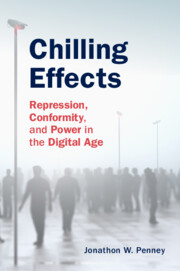Introduction
Published online by Cambridge University Press: 20 November 2025
Summary
This chapter introduces the concept of chilling effects and contextualizes it, both with historical and contemporary examples, including the chill of: recent state actions that are increasingly authoritarian; online surveillance in the Snowden leaks; big data collection in the Cambridge Analytica scandal; automated surveillance in Clearview AI; as well as the modern origins of the chilling effects concept. The author also discusses persistent skepticism about chilling effects by lawyers, judges, scholars, and researchers, and why, and provides an outline of the conformity theory advanced in the book. The author ends with a road map for the structure of the book.
Keywords
Information
- Type
- Chapter
- Information
- Chilling EffectsRepression, Conformity, and Power in the Digital Age, pp. 1 - 16Publisher: Cambridge University PressPrint publication year: 2025
Accessibility standard: WCAG 2.0 A
Why this information is here
This section outlines the accessibility features of this content - including support for screen readers, full keyboard navigation and high-contrast display options. This may not be relevant for you.Accessibility Information
Content Navigation
Allows you to navigate directly to chapters, sections, or non‐text items through a linked table of contents, reducing the need for extensive scrolling.
Provides an interactive index, letting you go straight to where a term or subject appears in the text without manual searching.
Reading Order & Textual Equivalents
You will encounter all content (including footnotes, captions, etc.) in a clear, sequential flow, making it easier to follow with assistive tools like screen readers.
You get concise descriptions (for images, charts, or media clips), ensuring you do not miss crucial information when visual or audio elements are not accessible.
You get more than just short alt text: you have comprehensive text equivalents, transcripts, captions, or audio descriptions for substantial non‐text content, which is especially helpful for complex visuals or multimedia.
Structural and Technical Features
You gain clarity from ARIA (Accessible Rich Internet Applications) roles and attributes, as they help assistive technologies interpret how each part of the content functions.
